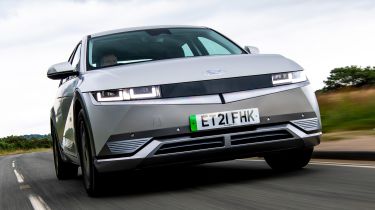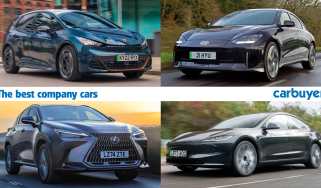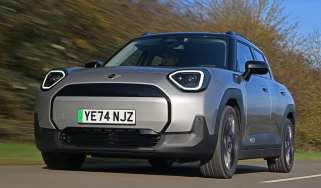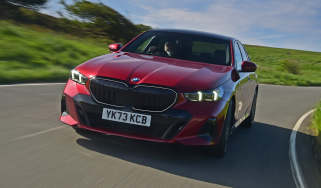Hyundai Ioniq 5 review - Range, charging & running costs
The Hyundai Ioniq 5 has a decent range but it's the 350kW charging that really impresses
The Ioniq 5 comes with all the benefits of a zero-emissions car, including reduced tariffs when heading into cities with low-emission zones like London's Congestion Charge Zone.
Two battery sizes are available, depending on your requirements and budget. The smaller 58kWh battery gives a range of up to 238 miles, while the most efficient 77kWh version can carry on driving for up to 315 miles. With a slightly smaller 52kWh battery, the Volkswagen ID.4 can manage up to 213 miles, while the top 77kWh version of that car has an official range of around 320 miles.
The Hyundai’s range figures are competitive if not earth-shattering, but in our experience, they’re very accurate, so any range anxiety should quickly disappear. Where the Ioniq 5 really scores highly is for its charging capability, which can top out at 232kW when using a 350kW public ultra-rapid charger. This is significantly faster than most of its rivals such as the Toyota bZ4X can manage, allowing for a 10-80% top-up in just 18 minutes. Few charging stations offer these speeds, though, so it'll take longer at a less powerful charger.
A full charge from a 7kW home wallbox takes eight hours for the 58kW version, while times for the 77.4kWh are still to be confirmed. Charging with a domestic three-pin socket is classed as 'emergency' charging by Hyundai; a full charge will take more than 30 hours for the biggest battery.
More reviews
As is the case with every zero-emissions car, the Hyundai Ioniq 5 finds itself in the lowest 2% Benefit in-Kind tax bracket for company car buyers, costing a higher-rate taxpayer around £400 a year. Private buyers will also benefit from zero VED (road tax) payments until 2025.
Insurance groups
Insurance groups for the Ioniq 5 are slightly higher than rivals, with the two-wheel drive 58kWh battery model sitting in group 35, while the 77.4kWh battery model with all-wheel drive in Ultimate spec sits in group 44. This puts the Ioniq 5 slightly above ID.4, which sits in groups 20-30, and even the Ford Mustang Mach-E, which sits in relatively high groups, with the Extended Range version placed in group 37.
Warranty
Every Hyundai comes with a five-year/unlimited mileage warranty, giving the Ioniq 5 an instant advantage over rivals from Volkswagen and Ford, which only come with three years of standard cover. Toyota is even more generous, however, providing up to 10 years of cover, as long as servicing is carried out by a main dealer.
Servicing
Hyundai offers service plans to help buyers budget for maintenance, spreading the cost over monthly payments. Servicing for electric vehicles should theoretically be simpler and more affordable than for a similar petrol or diesel model, as there are fewer consumable parts like engine oil, spark plugs and timing belts.


















